Why Netflix's Lemony Snicket Worked While the Film Did Not
This week we saw the debut of the new Netflix adaptation of the best selling book series 'A Series of Unfortunate Events' by the mysterious Lemony Snicket. It's a dark and foreboding tale surprisingly intended for children, detailing the lives of the Baudelaire children following the death of their parents in a fire. They are initially put in the care of the nefarious Count Olaf, a truly despicable man who is only interested in their fortune. In each subsequent book the orphans find themselves with a new guardian only for Olaf to reappear in disguise intending to murder their guardian and claim their fortune.

During the course of the series we get more and more clues concerning a secret organisation called the VDF. The Baudelaire parents were part of this group and there's plenty of spy glasses and secret passages involved. In addition to the guardians and murders there are other recurring elements in each story including libraries, eye motifs, literary references and inventions.
The first adaptation was a 2004 film directed by Brad Silbering, the man who brought us City of Angels and Casper. To say the film was a failure would be disingenuous as it performed moderately well. Its gothic art design was very well done and suited the material extremely well. Where it fell down was a lack of understanding of the source material. At a glance it would a appear to be a faithful recreation of the first three stories but it failed to capture the tone and sense of humour the books were known for.
The new Netflix series, on the other hand, have got it nailed down.
They Warn You Not to Watch
Every book in the series begins with a stern warning not to read any further, alluding to the horrors and bleak endings ahead and promising us that no matter what we hope for there will be no happy ending. The movie seemed unwilling to follow this line, perhaps afraid that people would get up and leave the cinema if a man on the screen told them to. The on screen Lemony Snicket (played by Jude Law) suggests that this movie would only be enjoyed by those who enjoy dark stories. Not really the same as the books continued insistence that you should not, under any circumstances, continue reading.
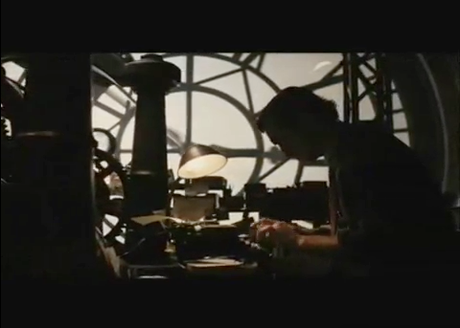
The Netflix version embraces the attitude of the books. Not only does Lemony Snicket (Patrick Warburton) insist that we shouldn't watch, but the entire theme song is spent telling the audience to "look away" and that there are much better things to watch.
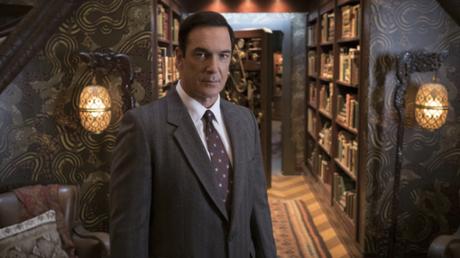
The Humour is as Dry As Can Be
'A Series of Unfortunate Events' had an odd style of humour, and not much of it can be easily translated to the screen. The narrator often breaks up the story to explain what long words mean and what Sunny is potentially saying. Snicket also explains dire events with a very matter-of-fact manner, taking time to explain metaphors rather than use emotive language. Each character is defined by a single strange characteristic, such as Mr. Poe's persistent cough.
The movie dropped many of these elements, instead using more cliched archetypes. Jim Carrey isn't a bad choice for Count Olaf (we'll get back to this in more detail later) but his over-the-top physical comedy detracted from the deadpan tone of the series. It does feel as though they wanted it to fit Carrey's comedic style rather than have Car rey work to capture the character.
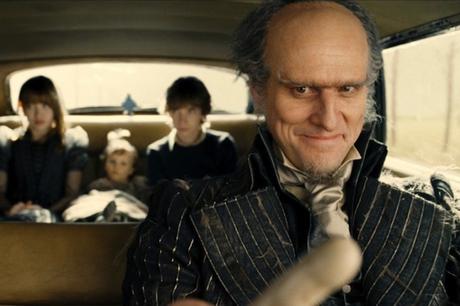
From the beginning of the Netflix series we get Patrick Warburton delivering the narration in an extremely dry manner, using props and costumes to heighten the surreal nature of this character. Seriously, they could not be more dry without collapsing from dehydration. They've also kept each character's odd characteristics to make them appear more comical. Other characters responding to Mr. Poe's coughing fits by waiting patiently for him to stop is a solid running gag. Another great visual gag comes with characters seemingly never noticing Olaf and his cronies making mistakes that would give them away before correcting themselves.
The Film Couldn't Help Adding a Happy Ending
In spite of the ongoing warnings about there being no happy ending in sight one can't help hoping there would be one, that the dire warnings are a red herring. Fortunately the books don't give us a happy ending, it would've felt like a cop out. The movie feels like it was...confused...about how to handle this as Hollywood has a fatal allergy to unhappy endings.
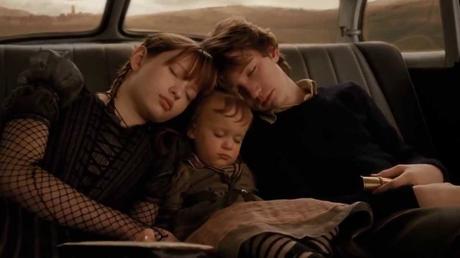
They were desperate to put some kind of positive spin on the ending, so there's a weak moral about them being 'fortunate to have each other'. It's lazy and tacked on. Then there's Count Olaf, who they wanted to be taught a lesson to cheer up the audience so he gets caught and put through the same dangers the kids were put through (for some reason). But they also wanted a sequel, so he escaped as well. Being so desperate to make the ending happy and satisfying and open ended and comedic they made it a total shambles. The idea that Olaf was put through the same horrors as the children also suggests that the adults had started to believe the children about what was happening, which would've made the sequel tricky.
Fortunately the series has already been picked up for a second season covering the next five books, so there's no silliness about happy endings. We get a very cool conclusion to the season, but not a happy one. We won't go into it here for spoiler reasons, but it walks that magic line between satisfying the audience and leaving them wanting more.
The Characters Haven't Been Managed By Marketing
Jim Carrey was a pretty good pick for Count Olaf. He's a good physical match and his over-the-top physical style of comedy suited the character to a degree. But the film makers seemed determined to make Carrey the central part of marketing the film. Count how many times they say his name in the original trailer. This lead to an increased focus on the character, and more instances of him being the focus of a scene rather than the children. There's also a number of trademark Carrey comedy moments, such as pretending to be a dinosaur for no particular reason.
There was some mixing and matching of Violet and Klaus' characters. During the films finale Klaus saves the day by inventing a grabbing hook - something Violet does. It spoke of a lack of understanding of how the stories work and the characters having one characteristic. Klaus also lost his glasses, no doubt to make him more appealing to the target demographic. Don't know what they were planning when they got to the sequel and they form a major plot point.
Neil Patrick Harris plays Olaf this time around, and seems determined to the lose himself in the role. This works best when he's playing Olaf in disguise, because there's still some of the actors distinct mannerisms coming through. That said this is a much stronger performance, and the attitude going into it makes it work.
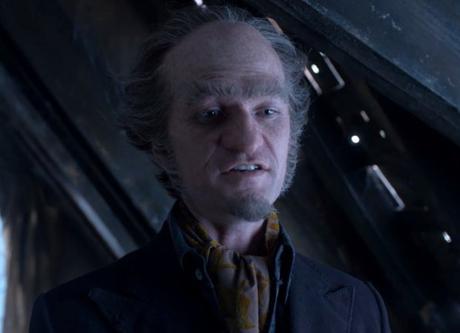
Overall the people involved in making this new series seem to be determined to do it justice. Barry Sonnenfeld has been behind the project, and he was original slated to direct the first film. He left the project during pre-production when the studio wouldn't meet his budget, so this is very possibly the his chance to do what he originally intended. Daniel Handler, the original author of the books, wrote a screenplay for the film but it was used, and now he's writing the teleplays for the series. Between the star and the main players the overall impression is that this is a passion project, not a potential film franchise made by the accounting department.
The New Material is Perfectly in the Spirit of the Books

The only notable addition to the movie was an attempted murder by train, which was a fun self contained sequence even if it didn't contribute much to the story. Given how closely the series has stuck to the source material it's surprising that they've included a major new addition to the plot. We occasionally cut away to two new characters named Father (Will Arnett) and Mother (Colbie Smulders) who are captured in the first episode and are seen participating in dangerous escapes and escapades in an effort to return to their children. Whether this is a red herring or a genuine beacon of hope is up to the viewer to discover, but it's the kind of ambiguous plot thread that would often appear in the original stories. It mixes things up for the existing fans and will keep them guessing rather than sitting through the same plots.
One of the biggest ongoing gripes with Hollywood is that they have a low opinion of the audience (and given the ticket sales of The Nice Guys versus Batman v Superman you can't really blame them). They dumb down adaptations, stick on happy endings and forcibly remove any subtlety. A Series of Unfortunate Events movie was subject to this with the darker edges of the story shaved off and the aforementioned changes to the ending. They also feel the audience needs everything spelt out for them. Although it was a nice enough visual trick, we didn't need to see the books Klaus was referring to when he thought back to them.
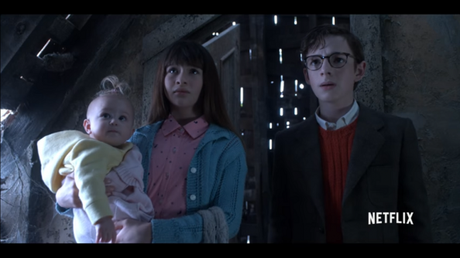
Netflix's new series trusts its audience not to expect happy endings. It trusts us to follow small details. It knows that fans are going to look for clues. We like this and we like you more for it.
There's plenty of reasons to check out the new adaption of the popular stories, but just in case you need one more...have you heard Neil Patrick Harris performing the theme song?

